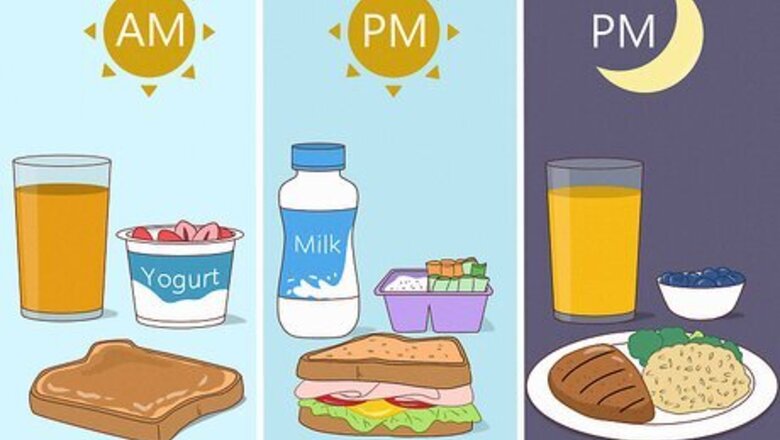
views
- You may be able to grow taller faster by eating a healthy diet rich in protein, fruits and veggies, grains, and dairy.
- Get plenty of exercise. Aim for an hour of moderate activity every day, whether you're playing a sport, dancing, or just walking.
- Your adult height is largely determined by genetics, so look to your parents and older siblings for clues as to how tall you might get.
Encouraging Growth with Proper Nutrition
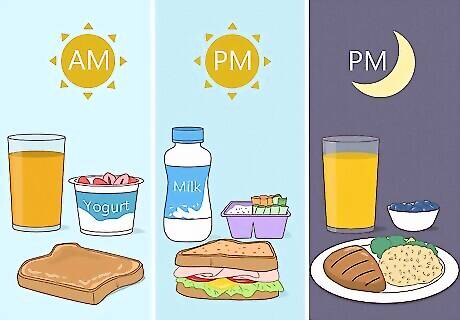
Eat 3 healthy meals every day. Food can give you the energy to get through the day, but it also helps your body grow. Getting the vitamins and minerals your body needs by eating healthy, regular meals and snacks can help you grow taller faster. Try to have breakfast, lunch, dinner, and two healthy snacks every day. This will help encourage your body to grow.
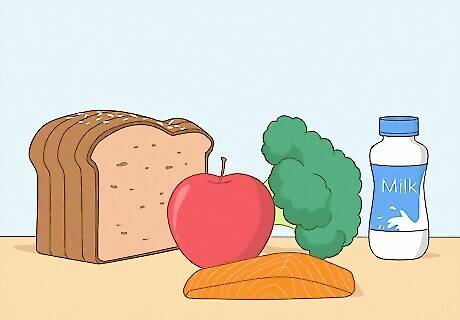
Choose foods from the five food groups. You need different vitamins and minerals to grow. Get what you need by eating a variety of foods from the five food groups every day. The five food groups are fruits, vegetables, lean proteins, grains, and dairy. Select fruits and vegetables such as strawberries, blueberries, apples, broccoli, spinach, and potatoes. Children aged 9-13 need about 34 grams of protein each day. Lean animal-based proteins like chicken, fish, and eggs are good options to help you grow, as are plant-based proteins like soy, tofu, chickpeas, and lentils. Get grains from whole wheat breads and pasta or some cereals. Fulfill your dairy requirements with milk, cheese, yogurt, ice cream, or vitamin-fortified soy milk. Eat two healthy snacks between meals like low-fat string cheese, yogurt, an orange, or apple slices. Healthy snacks help keep you full in between meals as well as avoid junk food.
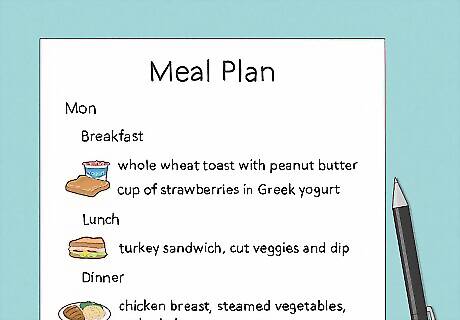
Make a meal plan. Planning out meals for each day of the week can help you make sure you're getting enough vitamins and minerals. Talk to your parents about doing the plan together so that you can get healthy meals at home and when you're at school. Write a specific plan for each meal every day. For example: “Monday: whole wheat toast with peanut butter, cup of strawberries in Greek yogurt, and glass of orange juice for breakfast; apple slices for a mid-morning snack; turkey sandwich, cut veggies and dip, and glass of milk for lunch; string cheese and crackers for afternoon snack; chicken breast, steamed vegetables, and salad for dinner; cup of blueberries and raspberries for dessert.” Consider packing your lunch on days that school food isn't as healthy as you would like. For example, you might pack a salad or a sandwich on pizza day. Eating healthy doesn’t mean never enjoying the foods you love! If you eat pizza now and again, it’s unlikely to affect your growth, so don’t worry too much about it. Get your parents involved in your meal plans. This might include writing the plan together, cooking with your parents, or helping them grocery shop.

Stay hydrated. Just like food, getting enough to drink helps your body grow faster. Water is the best choice. But even milk, fruit juice, and sports drinks can help you grow taller. Drink the recommended amount every day. Children between the ages of 9 and 13 need about 5 to 6 cups (1.2 to 1.4 liters) of water a day. Children between 14 and 18 need about 6 to 8 cups (1.4 to 1.9 liters). If you are physically active or it is very hot outside, you may need to drink more. Eating nutritious food like fruits and vegetables can add 2-3 cups of water towards your daily total.

Limit unhealthy choices. Nutrition is important to your growth. Foods like sweets or French fries or drinks such as soda are low in nutritional value and may keep you from getting what you need to grow. A salad instead of fries will help you grow faster and grilled chicken is healthier than a cheeseburger. However, don’t feel like you can’t eat your favorite foods even if they’re “unhealthy”; just don’t eat them every day. To make it easier to eat healthy, consider adding a cheat day or cheat meal to your week where you can eat whatever you want, or reward yourself for acing a quiz with your favorite snack.
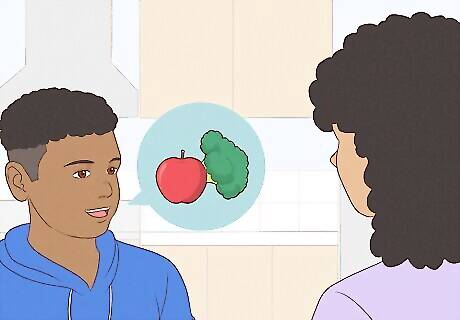
Get your parents involved. Tell your parents that you want to eat healthier to grow taller. Ask them to help you get the nutrition you need by helping you make healthy choices and cook food. Getting your whole family involved can make everyone a bit healthier and could help you get taller. Ask your parents if you can shop with them. You can all make decisions on food and meal planning together.
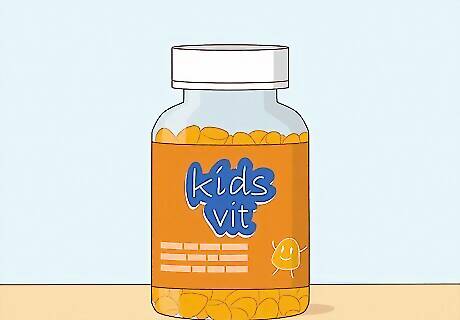
Consider taking a children's vitamin. Most kids get all the nutrients they need from food—even if they’re picky eaters. However, if you’re concerned you’re not getting the nutrition you need from your diet, talk to your parents about taking a children’s multivitamin. Never take any medicine without talking to your parents first. Try to adopt healthier eating habits before relying on vitamins for nutrition. Stay away from megavitamins, supplements, hormones, or anything not safe for children. These may harm your health and prevent you from growing taller.
Growing Taller by Exercising
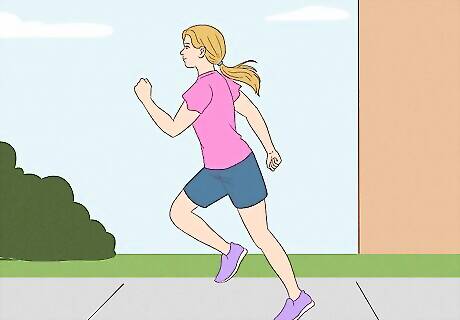
Exercise every day. Just like nutrition, regular exercise can help you grow taller. Playing sports or even going for a walk helps build your bones and muscles, which also help you grow taller. Try to do some type of activity every day. Do at least an hour of moderate activity every day. You could do things like running, swimming, biking, or even walking. Activities such as playing hide-and-seek, jumping on a trampoline, or jump-roping are other ways to get your body moving. Join a sports team or intramural club at your school. For example, if you're not into competitive sports, participate in a group that plays a sport like volleyball or dodgeball for fun.
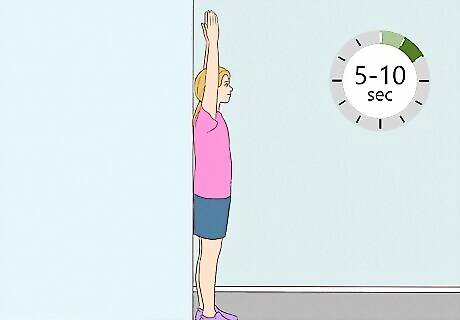
Stretch every day. As you walk or sit during the day, the bones in your spine press together. This makes you appear a bit shorter at the end of the day. Regular stretching may improve your posture, which can help you appear taller. Stand against a wall with your back against it. Raise your hands in the air as far as you can. Hold the stretch for 5-10 seconds and repeat 10 times. Sit on the floor and spread your legs wide apart. Bend forward at your hips and stretch your arms out to touch each of your feet. Hold the stretch for 5-10 seconds and repeat 3-4 times. Hang from a bar or a set of rings. Try to touch your legs to the ground.
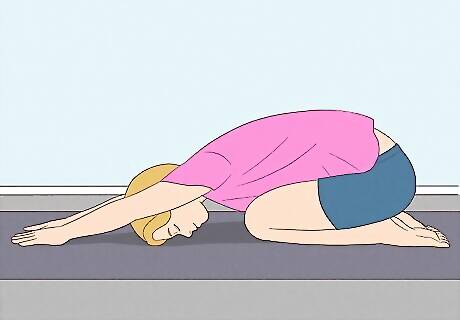
Try yoga. Doing some gentle yoga can stretch out your body, which is another way to appear taller. Even if you've never done yoga, just trying one or two poses can do a lot to stretch you out. Join a local yoga class, or watch a yoga video at home. Do a gentle form of yoga like restorative or yin yoga for the best stretching. If you can't do a full yoga session, do downward facing dog for 10 deep breaths. The downward dog looks like a triangle: bend forward and place your palms on the floor a few feet in front of your feet, and raise your bum in the air.
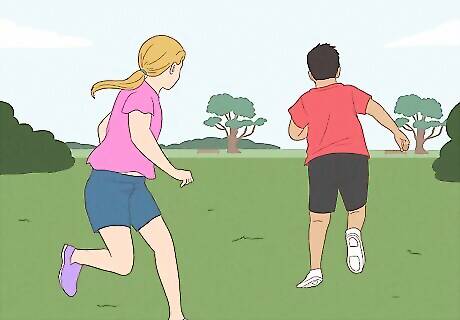
Enjoy active play. You might like playing video games or spending time on your tablet. These types of activities are fine in moderation, but they don't help you move and grow. Make a schedule of when you have downtime on your computer or devices. Ask your friends to do activities that move your whole body instead of sitting around the house: play tag together, or go on a walk around your neighborhood. Try video games such as karaoke or Wii that get you moving. Remember that some downtime or mindless play will help you rest, which is also an important part of growing.
Lifestyle Changes to Foster Growth
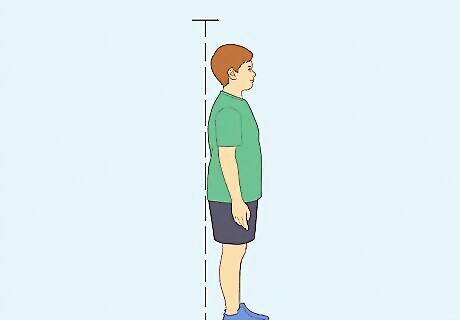
Stand tall. Maintaining good posture isn’t proven to actually increase your height, but it can stretch you out—making you appear taller. Make a habit of standing up straight and sitting in a chair with a back to improve your posture. Avoid sitting with your shoulders hunched over or forward, which can cause your spine to grow crooked. Pull your shoulders back and pull in your belly for the best posture.

Get plenty of rest. Just as moving your body is important to growing, so is giving it enough rest. Sleep helps your body recover from the day and grow better. Kids aged 6 to 13 need between 9 and 12 hours every night, while kids ages 14-17 need about 8 to 10 hours. If you get tired during the day, take a short nap of 30 minutes if you’re able. If you can’t take a nap, try doing a relaxing activity that doesn't require a lot of movement or using your brain.
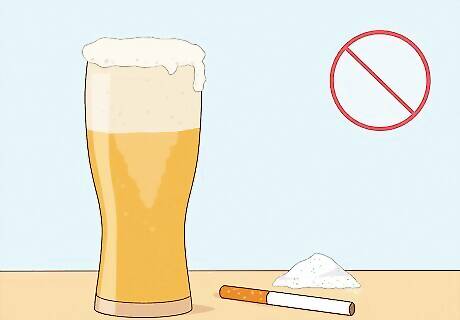
Avoid alcohol, drugs, and smoking. Like unhealthy food, unhealthy habits can also keep you from getting taller. Certain drugs may affect your physical appearance, including your height. Smoking cigarettes may prevent you from growing taller. Drinking alcohol may also stunt your growth. Talk to your parents, a trusted adult, or medical professional if you drink, smoke, or take drugs. They can help you find a way to stop any of these habits.
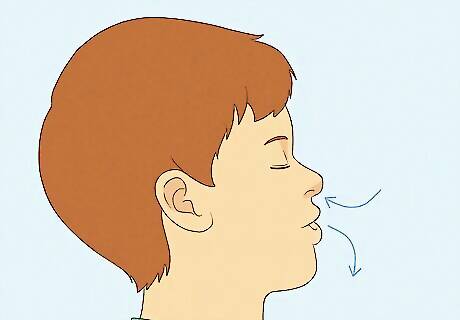
Reduce your stress levels. High stress levels can stagnate your growth. If you experience any stress because of school, bullying, peer pressure, or anything else, don't be afraid to talk about it with your parents or with a trusted adult. If you are feeling stressed, try doing some breathing exercises. Eating healthy foods and getting regular exercise can also help lower stress levels. Doing breathing exercises can help you feel calmer too. If you start to feel overwhelmed, breathe in as deeply as you can through your nose while counting to 5 in your head. Then breathe out through your mouth, counting to 5 again.
Other Factors to Consider
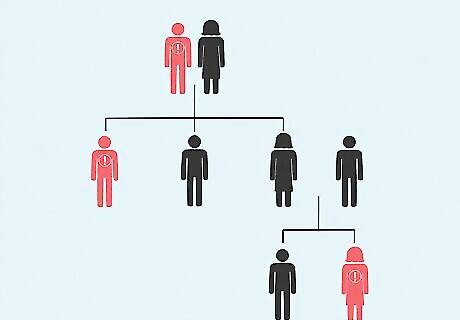
Genetics play a major role in your body’s development. While you may be able to grow taller with some lifestyle changes, your height is largely determined by your genetics. For example, if both of your parents are not very tall, you may not end up very tall, but if your folks are taller, you may grow taller too. Even if your folks are short, you may have tall relatives that you don't know. You may end up taller than you expected—or even taller than the rest of your family! Ask your parents and grandparents if they know how tall your ancestors were. You can also ask your siblings and parents when they grew. This can give you an idea of when you might have a growth spurt. Remember that you have other awesome things about you other than your height. Try and focus on things such as your great hair or something that you do well.
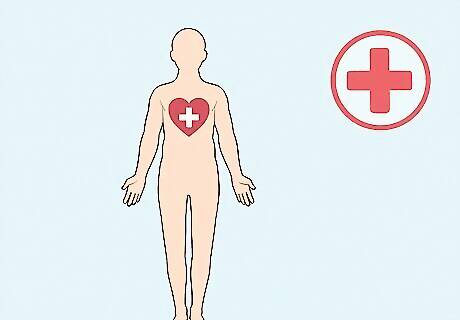
Certain health conditions may affect your growth. If you're worried about your height, make an appointment to see your doctor. A medical professional can not only make sure that you're growing properly but also diagnose potential issues hindering your growth. A doctor may also be able to give you tips to grow taller faster. Be honest with your doctor about your concerns about getting taller. Make sure your doctor knows things like what you're eating, what activities you're doing, and if you have any bad habits such as alcohol. Ask any questions you have about getting taller. Your doctor may be able to reassure you that just being patient is all you need to do. Puberty affects growth and can happen at different times for different people. Your doctor can also show you what percentile you fall into compared to your peers of the same age for height. Together, you can then use this information to discuss potential issues.




















Comments
0 comment